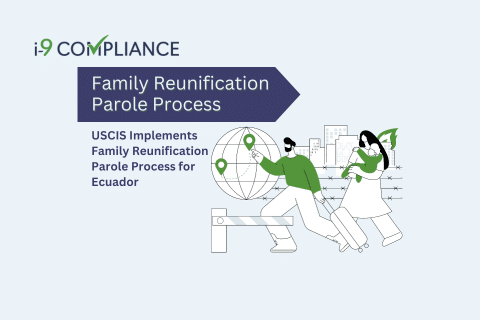USCIS Implements Family Reunification Parole Process for Ecuador

December 01, 2023
The U.S. Citizenship and Immigration Services (USCIS) has issued a Federal Register notice to implement a new family reunification parole process for Ecuador. This new policy resembles the one recently released for Colombia, El Salvador, Guatemala, and Honduras nationals.
Like the other policy, it will streamline the process for eligible individuals to gain entry to the U.S. and acquire employment authorization. It includes family members of U.S. citizens and lawful permanent residents. Under this new program, principal beneficiaries of an approved Petition for Alien Relatives (Form I-130) and their immediate family members may receive advance authorization to travel to the United States.
The approval also allows them to apply for up to three years of parole. Eligible individuals include Ecuadorian nationals outside the U.S. who do not possess an immigrant visa but have an approved Form I-130. This new process is by invitation only and begins when an individual files Form I-130. After receiving an invitation, the petitioner may request advance travel authorization on behalf of the primary beneficiary of the Form I-130 and their immediate family.
The beneficiary’s request for advance travel authorization must receive approval from the U.S. Customs and Border Protection. Once approved, they may travel to an interior port of entry. They may seek parole there, which the Department of Homeland Security (DHS) will grant on a case-by-case basis. This decision depends on a “demonstration of urgent humanitarian reasons or significant public benefit, as well as a demonstration that the beneficiary warrants a favorable exercise of discretion.”
This process does not grant an individual the right to reside in the United States permanently. Instead, it allows the beneficiary to parole for up to three years. Once paroled, beneficiaries may request employment authorization documents by filing an Application for Employment Authorization (Form I-765). These documents prove an individual’s work authorization and allow them to complete the Form I-9.
Form I-765 allows individuals to reside and work in the U.S. while waiting for an immigrant visa to become available. Individuals may request an additional period of parole if necessary. This request is also granted on a case-by-case basis by the DHS. The Department uses the same factors from the initial grant of parole when processing this request.
For employers, introducing this new process could open up new opportunities in the labor pool. For example, families of current employees could join the workforce if they enter the U.S. and gain employment authorization. Unfortunately, employers may find it challenging to complete their workers’ employment eligibility verification (Form I-9) process. One way to ease the process is by incorporating an electronic I-9 management tool. This tool can offer E-Verify integration, store documents, and guidance for completing the verification process.
Automate your employment eligibility verification today with the ensured compliance of I-9 Compliance.